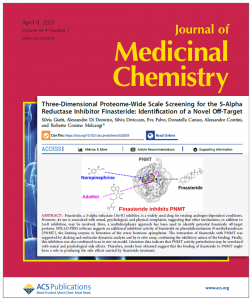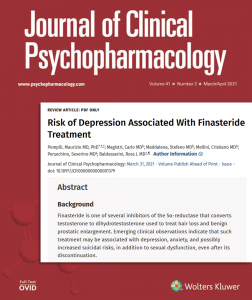Finasteride patients face a 51% greater risk of suicidal ideation or suicidal behavior than the general population, separate study demonstrates
April 13, 2021
Dear Friends:
 Phase V of the PFS Foundation-sponsored research at the University of Milano (UniMi) has found that finasteride, a 5-alpha reductase (5α-R) inhibitor, also inhibits phenylethanolamine N-methyltransferase (PNMT), an enzyme found primarily in the adrenal gland, which in turn may play a role in producing some of the condition’s most common side effects.
Phase V of the PFS Foundation-sponsored research at the University of Milano (UniMi) has found that finasteride, a 5-alpha reductase (5α-R) inhibitor, also inhibits phenylethanolamine N-methyltransferase (PNMT), an enzyme found primarily in the adrenal gland, which in turn may play a role in producing some of the condition’s most common side effects.
Titled Three-Dimensional Proteome-Wide Scale Screening for the 5‑Alpha Reductase Inhibitor Finasteride: Identification of a Novel Off-Target, the study is published this month in the Journal of Medicinal Chemistry.
Separately, a new meta-analysis, with a cumulative subject pool of 199,454, shows that finasteride use is “significantly associated with clinical depression” and “with strongly suggestive evidence of increased risk of suicidal ideation and suicidal behavior.”
Titled Risk of Depression Associated With Finasteride Treatment, that study appeared last month in the Journal of Clinical Psychoparmacology.
PNMT study
Roberto Cosimo Melcangi, PhD, led a team of six researchers at UniMi’s Department of Pharmacological and Biomolecular Sciences who deployed SPILLO-Potential Binding Sites Searcher for the first time ever in a PFS investigation. SPILLO-PBSS software was aimed at identifying alternative off-target protein interactions of finasteride.
Finasteride’s ability to inhibit PNMT was tested by treating live male rats and analyzing norepinephrine and epinephrine (aka adrenaline) levels in their adrenal glands. PNMT principally catalyzes the conversion of norepinephrine to epinephrine and is mainly involved in the stress response. Epinephrine is strongly correlated with mood alteration and depression. In addition, several studies indicate a role for this hormone in the control of erection.
Among the team’s findings and conclusions:
- “In support of our hypothesis, results revealed a reduction in the levels of epinephrine, with a concomitant increase of norepinephrine levels, coupled to no effect on PNMT protein levels. These findings suggest that the altered hormonal levels were due to a reduction of the enzymatic activity rather than to decreased levels of PNMT.”
- “PNMT activity perturbation may be correlated with sexual and psychological side effects. Therefore, results… suggest that the binding of finasteride to PNMT might have a role in producing the side effects exerted by finasteride treatment.”
- Publication of this study, funded in part by the PFS Foundation and Italian Ministry of University Research, marks the completion of Phase V of UNiMi’s PFS investigation.
Phase IV of Prof. Melcangi’s research was published in the Journal of Endocrinological Investigation in September 2020. Titled Alterations of gut microbiota composition in post-finasteride patients: a pilot study, the research demonstrated the presence of altered gut microbiota in PFS patients.
Phase III was published in Endocrine Connections in July 2019. Titled Altered methylation pattern of the SRD5A2 gene in the cerebrospinal fluid of post-finasteride patients: a pilot study, the study concluded that methylation of the SRD5A2 promoter in PFS patients “could represent an important mechanism of neuroactive steroid levels and behavioral disturbances previously described in PFS.”
Phase II was published in Psychoneuroendocrinology in January 2019. Titled Treatment of male rats with finasteride, an inhibitor of 5alpha-reductase enzyme, induces long-lasting effects on depressive-like behavior, hippocampal neurogenesis, neuroinflammation and gut microbiota composition, the animal-model study demonstrated that “Finasteride treatment causes several alterations in the hippocampus,” the section of the brain responsible for processing long-term memory and emotional responses.
Phase I was published in the Journal of Steroid Biochemistry and Molecular Biology in July 2017. Titled Neuroactive Steroid Levels and Psychiatric and Andrological Features in Post-Finasteride Patients, the research demonstrated that PFS patients suffer from altered levels of critical brain-function regulators including neuroactive steroids, and uncovered evidence of neuropathy of the pudendal nerve among those with severe erectile dysfunction.
 Depression risk pooled rates and meta-analysis
Depression risk pooled rates and meta-analysis
Ross J. Baldessarini, MD, at the Department of Psychiatry at Harvard Medical School led a team of five researchers from three other institutions including the University of Rome, Sant’Andrea Hospital in Rome and McLean Hospital in Belmont, MA, a Harvard Medical School affiliate.
In all, the team analyzed 14 peer-reviewed clinical studies, published between 2002 and 2018, that included reports of changes in mood, and suicidal ideation or behavior associated with finasteride use. The cumulative number of subjects exposed to finasteride was 102,520, and 96,934 not exposed to the drug. Among the team’s findings:
- Crude pooled rates demonstrated a risk of suicidal ideation or behavior that was 51% higher among subjects exposed to finasteride versus those not exposed to the drug.
- Meta-analysis yielded an odds ratio of 2.14 for the risk of clinical depression among subjects exposed to finasteride versus those not exposed to the drug.
- There was a “strikingly elevated risk of sexual dysfunction in male subjects” exposed to finasteride, with more than 60% of them in the cumulative subject pool experiencing this adverse reaction.
This study “supports the conclusion that [finasteride] treatment is significantly associated with risk of clinical depression, as well as high rates of sexual dysfunction and evidence of increased risk of suicidal ideation and perhaps of suicidal behavior,” concludes Dr. Baldessarini.
 It was funded in part by grants from the Bruce J. Anderson Foundation and the McLean Private Donors Psychiatry Research Fund.
It was funded in part by grants from the Bruce J. Anderson Foundation and the McLean Private Donors Psychiatry Research Fund.
Anyone living in the US who suffers from PFS should report his/her symptoms to the US Food and Drug Administration. Anyone living outside the US who suffers from PFS should report his/her symptoms to the US Food and Drug Administration as well as to his/her national drug-regulatory agency, as directed on our Report Your Side Effects page.
If you or a loved one are suffering from PFS, and feeling depressed or unstable, do not hesitate to contact the PFS Foundation via our Patient Support hotline: social@pfsfoundation.org.
Thank you.
Related News
Gut Microbiota Population is Altered in PFS Patients, New Research Demonstrates (Sept. 28, 2020)
Epigenetic Modifications Do Occur in PFS Patients, New Research Demonstrates (July 20, 2019)
